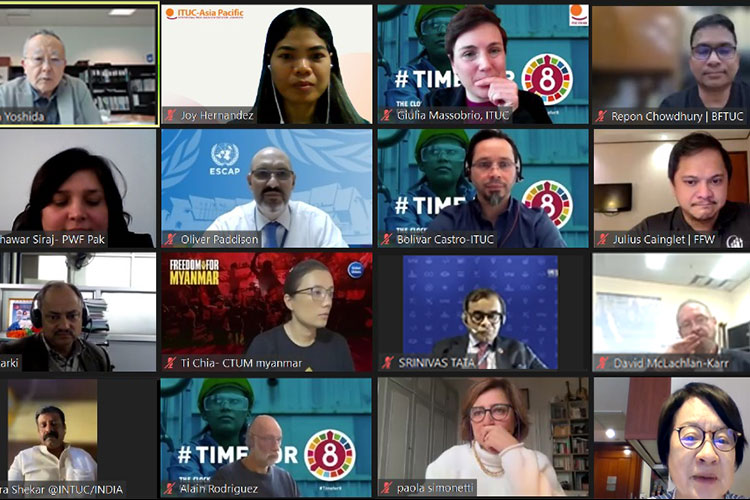The first day of the event was dedicated to preparations for the APFSD, scheduled for 20-23 February in Bangkok. Shoya Yoshida, ITUC Asia-Pacific Secretary General, opened the session by calling for 2024 to be the "year of peace and democracy." He highlighted the decline of democracy in Asia-Pacific, emphasising its reflection in the region’s underperformance on SDGs.
Following a detailed presentation of the network’s workplan for 2024, Ariel Castro, ILO ACTRAV Desk Officer for Asia and Pacific, urged trade unions to engage in the ongoing UN reform process. He advocated for respecting ILO principles, its normative mandate, and supervisory mechanism. Castro also highlighted positive examples of trade union engagement in India, Pakistan, Mongolia, Vietnam, and the Philippines.
This intervention preceded an overview of the state of the SDGs across Asia-Pacific. Oliver Paddison from UN ESCAP presented a concerning state of play, including a worrying regression to pre-2015 levels of SDGs 13. Among other UN proposals to address ongoing challenges, Paddison emphasised strengthening social protection, ensuring equitable access to basic services, and enhancing climate resilience.
Paddison’s presentation fed into the following session during which the ITUC presented its draft demands for the SDGs under review and invited participants to provide input.
The second day featured a high-level discussion with Srinivas Tata, Director of the Social Development Division at UNESCAP, Chihoko Asada-Miyakawa ILO Regional Director for Asia-Pacific, and the Director of the Development Coordination Office at UN ESCAP, David McLachlan-Karr. Tata stressed the multifaceted nature of poverty and advocated for increased social protection. Asada-Miyakawa highlighted the ILO’s Decent Work Agenda’s contributions across multiple goals, including social protection, green job creation, and peace through social dialogue. Concluding that session, McLachlan-Karr underscored the UN commitment to stronger collaboration with trade unions to address inequalities.
These interventions were followed by an exchange of first-hand experiences from trade union leaders across the region. Dur e Shawar talked about Pakistan Workers Federation’s (PWF) efforts in Pakistan for decent work, Chandra Shekar explained how the Indian Trade Union Congress (INTUC) is organising agricultural workers and gaining beneficial collective bargaining. Joy Hernández of ITUC AP talked about gains on just transition in several countries in the region, and Julius Cainglet from the Federation of Free Workers (FFW, Philippines) discussed actions to investigate and prevent attacks on trade unionists, aligning with SDG 16.
The ITUC-AP TUDCN members will continue to work in defence of decent work, democracy, social justice, and the fair distribution of wealth. As the region faces electoral challenges in 2024, the network will support trade unions in continuing to play a pivotal role in shaping a sustainable and inclusive future.
* All presentations, notes and background materials of this event are available here


